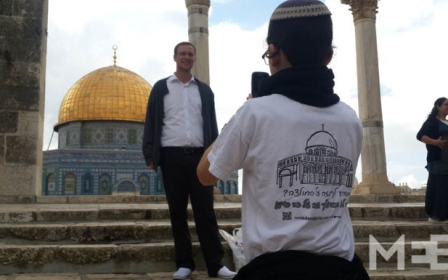Clashes rock Jerusalem's Al-Aqsa mosque compound

Palestinians and Israeli police clashed at Jerusalem's flashpoint Al-Aqsa mosque compound on Sunday just hours before the start of the Jewish New Year, police and witnesses said.
The police said that they entered the mosque because protesters had barricaded themselves in overnight with the aim of disrupting visits by Jews ahead of the holiday. They claimed to have found a pipe bomb after the raid.
But protesters and their supporters hold that they have a right to pray in the mosque and said the police evacuation of the complex after dawn prayers with tear gas and rubber bullets was part of an escalation in Israeli incursions at the site.
"To evacuate the mosque from Muslim prayers is something new," Knesset member Jamal Zahalka, who arrived at the complex after the incident, told Middle East Eye. "This is unprecedented."
The clashes reportedly began when Israeli forces stormed the compound early Sunday after dawn prayers. The forces then surrounded worshipers inside the mosque and closed its doors with chains and bars before they started to fire rubber-coated bullets, the witnesses told Ma’an. Israeli forces also reportedly attacked some Palestinians with pepper spray.
Police said they closed the doors to the mosque to lock in protesters who they said were throwing stones, fireworks and other objects. Authorities have used the same tactic in the past in a bid to restore calm and which has seen them briefly enter the mosque.
The incident drew calls of condemnation on Sunday from Palestinian President Mahmoud Abbas, Jordan, which has custodian rights over the Al-Aqsa mosque compound, and Egypt, the only Arab country other than Jordan to have signed a peace treaty with Israel.
"The presidency strongly condemns the attack by the occupier's military and police against the Al-Aqsa mosque and the aggression against the faithful who were there," a statement from Abbas's office said.
A statement from Israeli Prime Minister Benjamin Netanyahu, also released after the clashes, said that it was Israel's "right and duty to act against rioters to protect freedom of worship" at the site and that Israeli security forces would "move aggressively and immediately against those throwing stones, firebombs or pipe bombs".
The disturbances came with tensions running high after Israeli Defence Minister Moshe Yaalon last week outlawed the Murabitat and Murabitun, two Muslim groups that say they defend the site, holy to both faiths, from Israel's deepening control.
Zahalka said Sunday's incident was only the latest in a string of Israeli intrusions at the site that he said has been increasingly shut off to Muslims.
"Before 10 years ago, it was crazy to say that Jews go to pray in Aqsa. Now it has become mainstream ... we were shocked that they closed the doors. Now, it is a daily regulation to close the doors until the Jewish group finishes their tour," Zahalka said. "There are small changes here and there and that is the point."
Since 1967, he said, the Israelis have guaranteed Muslims access to the complex. "But they are changing it," he said, attributing the shift at Aqsa to the general political atmosphere in Israel, which he said is moving strongly to the right.
Later on Sunday morning, Israeli Agriculture Minister Uri Ariel visited the complex with Jewish activists, according to Haaretz, which also reported that 650 Jews also visited the site until it was closed at 11am (9:00 GMT).
Scuffles also reportedly broke out between Palestinian schoolchildren and police officers blocking the gates leading to the complex, and two Palestinians were arrested for allegedly attacking police officers.
Stay informed with MEE's newsletters
Sign up to get the latest alerts, insights and analysis, starting with Turkey Unpacked
Middle East Eye delivers independent and unrivalled coverage and analysis of the Middle East, North Africa and beyond. To learn more about republishing this content and the associated fees, please fill out this form. More about MEE can be found here.




